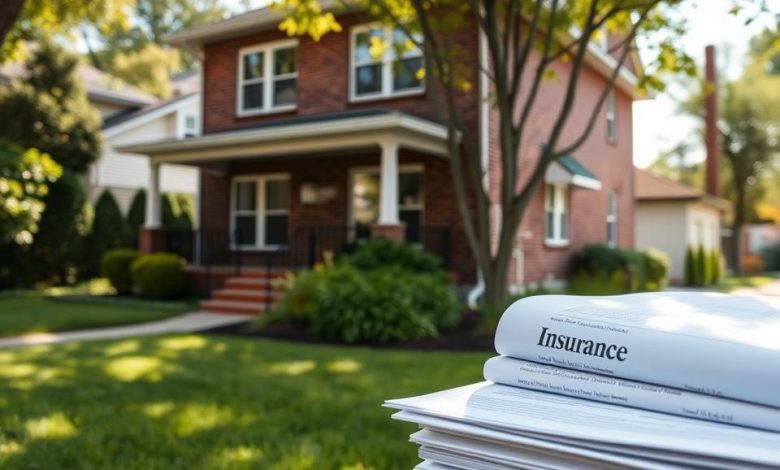Insuring Your Rental Property: Protect Your Investment

As a landlord, managing a rental property can be a lucrative investment, but it also comes with significant risks. Property damage, liability claims, and loss of rental income are just a few of the potential hazards that can impact your financial returns.
To mitigate these risks, it’s essential to have the right insurance coverage in place. Landlord insurance, also known as rental property insurance, provides a safety net against various risks, including property damage and liability claims. By understanding the different types of insurance available, landlords can choose the coverage that best suits their needs and protects their investment.
Key Takeaways
- Landlord insurance protects against property damage and liability claims.
- Rental property insurance provides a safety net against various risks.
- Understanding different types of insurance is crucial for landlords.
- The right insurance coverage can help mitigate financial losses.
- Landlords should choose insurance that suits their specific needs.
Understanding Rental Property Insurance Basics
Landlords must comprehend the fundamentals of rental property insurance to mitigate potential risks. Rental property insurance is designed to protect landlords from various risks associated with renting out their properties.
The Difference Between Homeowners and Landlord Insurance
Homeowners insurance and landlord insurance serve different purposes. Homeowners insurance typically covers owner-occupied homes, while landlord insurance is designed for rental properties.
Read More:- Landlord Insurance: Safeguard Your Rental Investment
Key Coverage Distinctions
Landlord insurance often includes coverage for loss of rental income, vandalism, and malicious damage by tenants, which are not typically covered by standard homeowners policies. This distinction is crucial for landlords to understand to ensure they have adequate coverage.
Legal Requirements for Landlords
In many states, landlords are legally required to have a certain level of insurance coverage. For instance, liability insurance is often mandatory to protect against potential lawsuits. Landlords need to familiarize themselves with local regulations.
Why Standard Homeowners Policies Don’t Work for Rentals
Standard homeowners’ insurance policies are not designed to cover the unique risks associated with rental properties. Using a homeowner’s policy for a rental property can leave landlords exposed to significant financial risks.
Liability Gaps in Standard Policies
Standard homeowners’ policies often lack adequate liability coverage for rental properties. Landlords may face lawsuits from tenants or guests, making comprehensive liability coverage essential.
Rental-Specific Risks to Consider
Rental properties are exposed to risks such as tenant damage, loss of rental income, and legal liabilities. Landlord insurance can protect against these risks, ensuring financial stability.
| Insurance Type | Coverage | Typical Use |
|---|---|---|
| Homeowners Insurance | Covers owner-occupied homes against damage and liability. | Primary residences |
| Landlord Insurance | Includes coverage for rental income loss, vandalism, and liability. | Rental properties |
Essential Coverage Types for Insuring Your Rental Property
Understanding the different coverage types for rental property insurance is vital for landlords. This knowledge helps protect their investment and minimizes potential risks.
Property Damage Protection
Property damage protection is a fundamental aspect of rental property insurance. It covers damages to the property itself, including the building and attached structures.
Dwelling Coverage Options
Dwelling coverage options vary, allowing landlords to choose the level of protection that suits their needs. This includes coverage for the main dwelling and other structures on the property.
Personal Property Considerations
Landlords should also consider coverage for personal property used to maintain or service the rental property, such as appliances and furniture.
Liability Coverage
Liability coverage is another critical component, protecting landlords against potential lawsuits arising from injuries or damages to others on the property.
Legal Defense Protection
Legal defense protection is part of liability coverage, helping to cover legal expenses in case of a lawsuit.
Medical Payment Coverage
Medical payment coverage helps pay for medical expenses if someone is injured on the property, regardless of fault.
Loss of Rental Income Insurance
Loss of rental income insurance provides financial support if the property becomes uninhabitable due to damage, ensuring landlords can continue to meet their financial obligations.
Calculating Adequate Coverage Amounts
Calculating the right amount of coverage involves considering the potential loss of income and the time it may take to repair or rebuild the property.
Coverage Duration Options
Coverage duration options vary, allowing landlords to choose how long they are covered in case of a loss.
| Coverage Type | Description | Importance Level |
|---|---|---|
| Property Damage Protection | Covers damages to the rental property | High |
| Liability Coverage | Protects against lawsuits and medical expenses | High |
| Loss of Rental Income Insurance | Compensates for lost income due to property damage | Medium |
How to Select the Right Rental Property Insurance Policy
The process of selecting a suitable rental property insurance policy involves several key considerations. Landlords must evaluate various factors to ensure they have adequate coverage for their investment.
Evaluating Insurance Providers
When evaluating insurance providers, it’s essential to consider their financial strength ratings and customer service reputation.
Comparing Financial Strength Ratings
Financial strength ratings indicate an insurer’s ability to pay claims. Look for providers with high ratings from reputable agencies like A.M. Best or Moody’s.
Reviewing Customer Service Reputation
A provider’s customer service reputation can significantly impact your experience. Research online reviews and ask for referrals to gauge satisfaction levels.
Getting and Comparing Multiple Quotes
Obtaining and comparing quotes from multiple insurance providers is crucial for finding the best policy.
Essential Information to Provide
When requesting quotes, be prepared to provide detailed information about your rental property, including its location, value, and any security features.
Analyzing Coverage vs. Cost
Carefully analyze the coverage offered versus the cost of the policy. Ensure you’re comparing similar coverage limits and deductibles.
Working with an Insurance Agent
Working with a professional insurance agent can provide valuable insights and help you navigate the complexities of rental property insurance.
Benefits of Professional Guidance
An experienced agent can offer tailored advice and help you identify potential gaps in coverage.
Questions to Ask Your Agent
Prepare a list of questions to ask your agent, such as what is covered, what is excluded, and how claims are processed.
Maintaining and Updating Your Rental Property Insurance
Maintaining adequate rental property insurance is crucial for protecting your investment. As a landlord, regularly reviewing your insurance policies ensures they remain relevant and adequate to cover potential risks.
Updating insurance coverage as needed helps protect against new risks and ensures your investment remains secure. This includes adjusting your policy to reflect changes in property value, rental income, or liability exposure.
By prioritizing maintaining insurance and updating insurance, you can safeguard your rental property investment and minimize potential financial losses. Regular policy reviews with insurance providers like State Farm or Allstate can help identify necessary updates and ensure you have the right coverage.
FAQ
What is the difference between homeowners’ insurance and landlord’s insurance?
Homeowners insurance is designed for owner-occupied homes, while landlord insurance is specifically designed for rental properties, covering risks associated with renting, such as property damage and liability claims.
Why can’t I use a standard homeowners policy for my rental property?
Standard homeowners’ policies are not designed to cover rental properties and often leave landlords exposed to significant liability gaps, making it essential to have a separate landlord insurance policy.
What types of coverage are essential for insuring my rental property?
Essential coverage types include property damage protection, liability coverage, and loss of rental income insurance to protect against various risks associated with renting.
How do I choose the right rental property insurance policy?
To choose the right policy, evaluate insurance providers based on their financial strength ratings and customer service reputation, compare multiple quotes, and work with a professional insurance agent for guidance.
What factors should I consider when evaluating insurance providers?
Consider factors such as financial strength ratings, customer service reputation, coverage options, and cost to ensure you select a reliable insurance provider.
How often should I review and update my rental property insurance policy?
Regularly review your insurance policy to ensure it remains relevant and adequate, updating coverage as needed to protect against new risks and ensure your investment remains secure.
What is loss of rental income insurance, and how does it work?
Loss of rental income insurance provides financial support if your rental property becomes uninhabitable due to damage, helping to cover lost rental income during the repair or rebuilding process.
Can I work with an insurance agent to get the right coverage for my rental property?
Yes, working with a professional insurance agent can provide valuable guidance and help you make informed decisions when selecting a rental property insurance policy.









